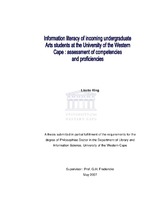| dc.description.abstract | The majority of incoming undergraduate Arts students at the University of the Western Cape (UWC) come from South African historically disadvantaged black schools. Because of enormous varying secondary school experiences and competencies as well as a lack of exposure to school and public libraries, students are deprived of the basic information skills. Without these crucial skills, students will find it difficult to cope successfully with their academic courses and measure up to the demands of employers. The study aimed to answer the following research questions: what are incoming Arts students' previous experiences with libraries and information technology? What are incoming undersgraduate Arts students information skills, competencies and proficiency? Is the Library Science 121 (Arts information Literacy) course sufficient for teaching information literacy and to address deficiencies? A pen and paper questionnaire based on the Information Literacy Standard by the American Library Association to assess the information literacy level of incoming Arts students was designed by the Department of
Library and Information Science, the University Library and the Digital
Academic Learning Division. This was utilized to assess the exposure to information literacy training at school level, computer and public library skills as well as their level of information literacy of incoming
undergraduate Arts students. As a post-test, the questionnaire was
completed by students after completing the information literacy course, Library Science 121. To determine the impact of formal training compared to initiatives within disciplines, the results of the post- and control tests were compared. Data was gathered over a period of three years. Of the 483 incoming Arts students 22.2% owned their own computers. Of the rest 39.5% had other means to get assess to computers. In total 16.5% of students used the World Wide Web to find information. Only 23.2% attended secondary schools with school libraries and 10.4% of these students received information literacy education. Of all the students, 20.7% were members of a public library of which 41.0% visited the library
every few months mainly for photocopying. Of the thirty three questions asked to test information literacy, in only 7 the
percentage of students in the pre- and control groups who have chosen the correct answer was higher than the incorrect options – indicating an unacceptable low level of information literacy. Students performed significantly better in the post-test. It is an indication that formal information literacy education is essential for incoming Arts students at the UWC. Results were used to identity deficiencies in information literacy levels, to produce benchmarks for assessing information literacy at the university and to produce a theoretical framework for structured cumulative information literacy initiatives within new envisaged foundation programs. Curricular changes to keep pace with current trends and needs were made. Data gathered will be used to communicate to the Arts Faculty the need for formal information literacy training for all incoming Arts students at the
UWC and to incorporate information literacy in student learning outcomes as well as in the assessment policy. | en_US |

